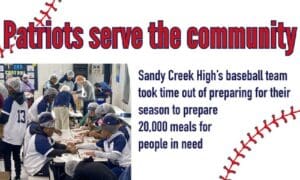The Fayette Visioning Initiative continues to move forward. One of the phases in the process of developing the vision document later this year was a public meeting held March 5 at Sandy Creek High School where 160 people attended.
Representatives from consulting firm Market Street outlined the eight “storylines” that came from a recent community survey. The storylines reflect the value of the core assets that have made Fayette County a leading destination within metro Atlanta and Georgia, while also recognizing some of the key challenges that face the county, representatives said.
Key to understanding the “on-the-ground” dynamics in Fayette County, Market Street conducted public input sessions over three days in early December 2013. Over 220 individuals took part and offered their thoughts and opinions through a series of focus groups, one-on-one interviews and a community leadership meeting.
A community survey was also employed to give residents the chance to share their voice and opinions. The survey was open in December and received 1,478 responses, according to www.fayettevision.org.
The March 5 public meeting represented an additional way for the community to hear the storylines reviewed and offer input at the end of the meeting.
Fayette’s storylines include “Growth and Migration,” “Shifting Race and Ethnicity,” “Local Education: Preserving an Asset,” “Highly Educated and Affluent: But Are We Losing Ground,” “Recession, Recovery and Economic Transition,” “Spatial Mismatch: Resident Skills and Local Jobs,” “Quality of Life: Amenities, Mobility and Housing Options” and “Safety and Perception of Crime.”
A number of questions based on the storylines were asked of attendees at tables set up in the cafeteria at the conclusion of the meeting. Participants could provide a hand-written response or send a text response. Attendees were asked:
• On quality of life — What characteristics should be included in housing developments that could help us attract more professionals?
• On recession, recovery and economic transition — How can we assist in helping entrepreneurs and small businesses thrive in Fayette County?
• On spatial mismatch and residents skills and local jobs — What transportation and mobility improvements should be prioritized in Fayette County?
• On highly educated and affluent but are we losing ground — How do we better coordinate and support nonprofits in Fayette County?
• On local education and preserving an asset — How can Fayette County differentiate its educational offerings to position ourselves as leaders in workforce development and 21st century education?
• On shifting race and ethnicity — How can we include all residents in leadership and engagement opportunities in Fayette County?
• On growth and migration — Are there things about the population and demographic data that surprise you? If so, what specifically?
• On safety and perception of crime — What can we do to ensure that Fayette County continues to be a safe community?
Market Street this summer will produce the Fayette Vision document based on research and input gathered from the survey, focus groups, one-on-one interviews and the community leadership meeting. The Fayette Vision document will answer the questions, “where do we want to be?” and “how do we get there?”
Coming later, the final phase will be one where the community determines how to implement the vision.
Those in the Fayette community who have not viewed the Competitive Analysis will find it full of a large volume of information relating to the topics covered in the eight storylines. The data covered in topics such as demographics and crime may come as a surprise to some in the community since a number of widely-held perceptions are not based in fact.
To view the entire visioning process document and to examine the Competitive Analysis visit www.fayettevision.org.












Leave a Comment
You must be logged in to post a comment.